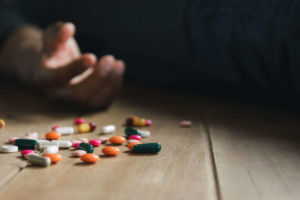
In 2024, Nicola Price (57 years old), died from an accidental overdose of paracetamol. She took the medicine for flu symptoms after returning from Tenerife. Seven days later, she died from organ failure.
Self-medication
Self-medication is the use of drugs to treat symptoms or conditions that you believe you have, without consulting a doctor. It can include using herbs, reusing prescription drugs, or purchasing prescription-only drugs without seeing a doctor.
Types of painkillers commonly misused
- Paracetamol (Acetaminophen)
- Opiates (e.g. Codeine, Oxycodone and Hydrocodone)
- Non-steroidal Anti-inflammatory Drugs (NSAIDs) (e.g. Aspirin, Ibuprofen)
Reasons for self-medication
- Convenience and accessibility: It saves time, financial constraints, easy availability, and distance from a healthcare facility, and the condition may not be serious enough for medical consultation.
- Lack of knowledge: People may not be aware of the possible dangers of using painkillers – especially over-the-counter (OTC) drugs like ibuprofen – for self-medication. Individuals might use them for a longer period of time or take more than is advised. Liver and kidney damage may result from this issue.
- Cultural influence: Cultural beliefs and practices can influence self-medication behaviour, e.g. painkiller misuse may become normalised.
Risk of self- medication
- Incorrect diagnosis: Self-medication can make the condition worse and delay proper care.
- Drug interactions: Combining painkillers with other medications, such as antidepressants, and blood thinners, can result in dangerous drug interactions.
- Dosage errors: Taking incorrect doses can lead to toxicity or even death. For instance, as seen in the case of Nicola Price, taking too much paracetamol can result in liver failure.
- Dependency: Taking painkillers routinely can lead to dependency.
- Side effects and toxicity: Serious issues including liver damage or gastrointestinal bleeding might result from self-medication.
- Psychological effects: Long-term use of opiates, for example, can result in anxiety and depression.
- Specific risks to vulnerable groups: The elderly, children or pregnant women, or those on multiple medications, are at higher risk of harm when self-medicating with painkillers.
Alternatives to self-medication
Before taking any new medication, consult a healthcare professional. Use over-the-counter remedies as advised by a pharmacist, especially if you have other health conditions. If you feel pain, sometimes making lifestyle changes, like stretching, exercise or resting, might help. Try this first.
Good practices for medication safety
- Understand dosage
- Avoid long-term use – unless prescribed by a doctor or pharmacist
- Be aware of side effects
- Consult a health professional if unsure
- Seek immediate help. If you have started a new medication, and experience severe side effects, an overdose, or worsening symptoms, contact NHS 111 or go to the nearest hospital A&E department.
References
Self-medication with OTC analgesics (Mehuys, 2018)
Image: https://www.genesisrecovery.com/how-long-does-it-take-to-overdose-on-pills/

